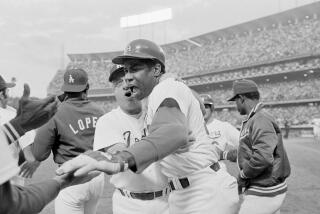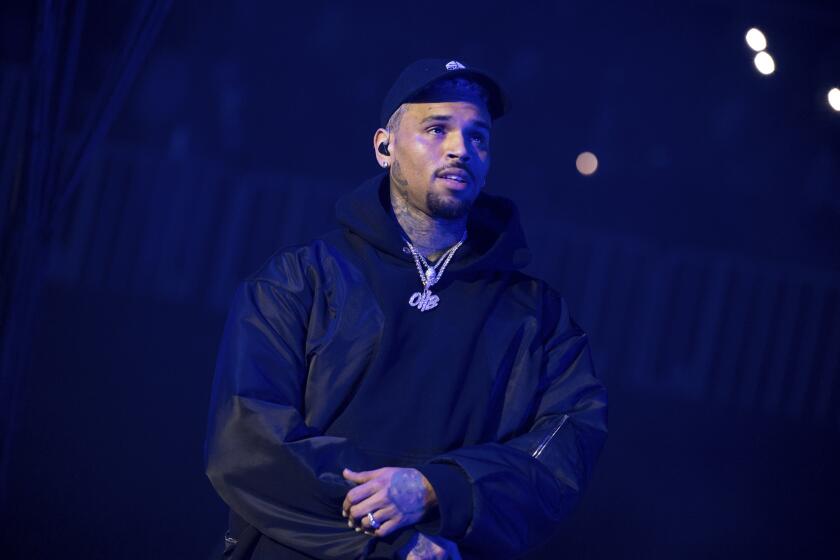The Discovery of a Gem: ‘Bird’-Baker Jam Session : Jazz: The live recording documents the playing of the legendary saxophonist and trumpeter one night in 1952. Luckily, an Orange County enthusiast was there with his tape recorder. . . .
- Share via
Gold is where you find it in the hit-and-miss world of jazz recordings. And San Diego-based Time Is records recently dug up a real gem: “Bird and Chet: Inglewood Jam” a June, 1952, session attended by trumpeter Chet Baker and saxophone legend Charlie (Bird) Parker at the Trade Winds Restaurant in Inglewood. Luckily for jazz fans, Orange County resident Bob Andrews and his tape recorder were there, too.
At the time, Andrews, a recent arrival from Wisconsin who supplemented work in a record store with gigs as a drummer for trombonist Bob Enevoldsen and pianist-composer Marty Paich, was a regular on the local club scene. “In those days, I had a set routine,” the 72-year-old music aficionado said recently from his home in Mission Viejo. “Go to work and, on weekends go to the clubs with the tape recorder.”
Andrews, who ran Bob Andrews’ Recordville in Redondo Beach for almost 20 years and still operates a mail-order business, had befriended the late Los Angeles bassist Harry Babasin, a veteran of the Gene Krupa, Benny Goodman and Woody Herman bands of the 1940s.
“Harry was always good at organizing groups,” Andrews said, “and he put together this one-nighter with Bird. Bird was in town (playing two weeks at the Tiffany Club at 8th and Normandie in L.A.) and somehow Harry got a hold of him at his hotel and asked him to come over to one of the sessions. Harry said Bird was pretty nice about it and said, ‘Sure, I’ll come on over.’ ”
Babasin, who managed a small record label called Jazz Chronicles, also had the foresight to invite Andrews and his tape deck.
“I had taped guys like Warne Marsh, Wardell Gray, Gerry Mulligan,” Andrews recalled. “They weren’t thought of as giants yet in those days, but they were sure good musicians. Hampton Hawes was a close friend, and I’d taped Hamp a few times.”
True to his reputation, Parker arrived late at the Trade Winds. “The first set went by and then, all of a sudden, Bird strolled in and everybody got excited--me included,” Andrews recalled. “He sat in the audience awhile, then strolled up on the stand after Sonny Criss had taken the first solo--he waited until they got into the tune. Bird really came on; we hadn’t heard such playing before. It was such a joy to hear him, there was electricity flowing through the room when he was there.”
“He played through the second set and then, all of a sudden, he was gone. The band played another set, then Harry and I tried out the tape and found it really came out very nice.” In addition to Parker and Baker, the group that night included alto saxophonist Criss, pianist Russ Freeman, drummer Larance Marable and Babasin on bass. At first, listeners might think they’re hearing Parker instead of Criss, whose style had been influenced by Bird and who takes the first solo on the CD’s opener, “The Squirrel.” But once Parker joins in with his distinctive tone and fluid lines, there’s no confusion. This was one night he was really on.
Also impressive is then-22-year-old Baker, recently discharged from the Army and eager to get back into playing.
A relative unknown, Baker had auditioned for Parker’s engagement at the Tiffany Club and was hired immediately. While he sounds a bit tentative at times echoing Bird’s fiery theme statements, the young trumpeter solos with authority and his own brand of tempered heat. Possibly because of the up-tempo nature of the tunes, little is heard of the winsome lyricism that later became the trumpeter’s trademark.
Though the sound quality is considerably better than the original release on Babasin’s Jazz Chronicles label, it still reflects the limitations of ‘50s recording technology. Andrews’ Pentron recorder used a single microphone and the rhythm section sounds a bit distant and muffled, though, unlike many live recordings from the period, there is some depth in the string bass and bass drum.
The live recording documents completely Parker’s playing that night, blemishes and all. A fleet version of “Indiana” is marred by what sounds like a foot loudly tapping on a wooden floor, or knuckles on a table. “That was Harry (Babasin),” Andrews recalls, “slapping on his bass.”
“I recorded everything from that one set, and they were long tunes. If you’re looking for a CD with extra tracks, you won’t find it because there were no more,” Andrews said.
Not long after it was recorded, the original Trade Winds tape was lost when Andrews loaned it to a friend. “When I asked where the tape was, (the friend) said he sent it to a friend of his in Europe. The next thing I knew, it was being bootlegged in England.”
Fortunately, Andrews kept a copy.
Andrews’ friendship with Time Is owners Fred Norsworthy and Otto Gust led to the release of the first reissue on the new label (which has also released a recent recording of guitarist Robert Conti called “Comin’ On Strong”).
Gust, executive producer of the reissue and president of Time Is, says the label will soon release Shorty Rogers and Art Pepper sessions that Andrews recorded in the 1950s. But he’s especially proud of “Inglewood Jam.”
“I didn’t do this to get a hit record,” Gust said last week from San Diego. “This is something people will still be listening to in 10 or 15 years. It’s a historical event: Bird didn’t come out to California that much and Chet Baker was just starting to play again. It’s something I wanted to share with other listeners out there.”
More to Read
The biggest entertainment stories
Get our big stories about Hollywood, film, television, music, arts, culture and more right in your inbox as soon as they publish.
You may occasionally receive promotional content from the Los Angeles Times.










